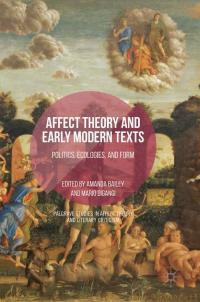Step Into NarraSpace: UMD’s Hub for Immersive Storytelling and Inclusive Scholarship
With VR headsets and tactile tools, UMD's new lab is redefining what scholarship can look—and feel—like.


Read More about “The Theater and the Early Modern Culture of Debt"
The only evidence to the contrary was the mute protest in your own bones, the instinctive feeling that the conditions you lived in were intolerable and that at some other time they must have been different.
- George Orwell, 1984
When I read about the group of women in Handmaid’s Tale red robes and white bonnets who staged a pro-choice protest in the Texas Senate the week of Monday, March 20th, I thought about the power of image. The group of women—channeling the characters in Margaret Atwood’s dystopian 1985 novel who were forced by the government to breed—sat silently in the senate gallery while the anti-abortion bills were passed. In videos posted on Instagram, we see them marching in the senate’s hallway, holding pro-choice signs written not on paper, but on white cloth. The white rectangles, displayed in front of them, one would say, in front of their bellies, swayed to the rhythm of their steps, as they silently follow one another in the eerie procession.
When Pierre was published one year after Moby-Dick, expectations were high. Readers expected—and Melville delivered—adventure, humor, and brilliance. Magnificent and strange, Pierre is a richly allusive novel mirroring both antebellum America and Melville’s own life. This Norton Critical Edition includes: · The Harper & Brothers 1852 first edition of the novel, accompanied by Robert S. Levine and Cindy Weinstein’s editorial matter. · Six illustrations. · Contextual and source materials, including letters, responses to Pierre by Melville’s contemporaries, and works by Daniel Webster, Thomas Cole, James Fenimore Cooper, Lydia Maria Child, and Nathaniel Hawthorne, among others, that give readers a sense of Pierre’s time and place. · Seven critical essays on Pierre’s major themes by Sacvan Bercovitch, James Creech, Samuel Otter, Wyn Kelley, Cindy Weinstein, Jeffory A. Clymer, and Dominic Mastroianni. · A Chronology and a Selected Bibliography.

From the publisher:
The first book to put contemporary affect theory into conversation with early modern studies,this volume demonstrates how questions of affect illuminate issues of cognition, political agency, historiography, and scientific thought in early modern literature and culture. Engaging various historical and theoretical perspectives, the essays in this volume bring affect to bear on early modern representations of bodies, passions, and social relations by exploring: the role of embodiment in political subjectivity and action; the interactions of human and non-human bodies within ecological systems; and the social and physiological dynamics of theatrical experience. Examining the complexly embodied experiences of leisure, sympathy, staged violence, courtiership, envy, suicide, and many other topics, the contributors open up new ways of understanding how Renaissance writers thought about the capacities, pleasures, and vulnerabilities of the human body.
Description:
Candy, a junior in boarding school, is kidnapped. The more time she spends with her mysterious and handsome captor, Levon, the more she learns the whole scheme is not just about ransom. It's about revenge. What began as a kidnapping is spiraling into a crazy road trip adventure as Candy and Levon find a lot of wrong ways to do the right thing.
"Like the best pop songs, Stewart Lewis's novel, Stealing Candy, hits all the right notes. It's funny, suspenseful, touching, sexy ... it's also a road trip, a love story, and an affecting portrait of two desperate characters. I ate it up." - Louis Bayard, New York Times Notable Author of Lucky Strikes
"Stealing Candy is that rare sort of read that keeps you not just guessing, but gasping with every turn of the page." - Kieran Scott, author of Pretty Fierce
"A page-turning, stay-up-late story. Readers are going to love Candy and her wonderful mix of resourcefulness and jaded innocence. " - Cammie McGovern, author of Say What You Will
That we could, as we do, live in the realm of eternal mirrors,
working our way at the same time through unmowed grasses.
- Czesław Miłosz
When on December 13th, 1991—the tenth anniversary of martial law being declared in communist Poland to crush the political opposition—I stepped on the tarmac of John F. Kennedy’s International Airport in New York, leaving Poland forever, I promised myself to forget who I was for the first 25 years of my life. I didn’t want to be political anymore. There was too much pain in it, and too much pain in remembering the extent to which it affected the lives of everyone I knew.